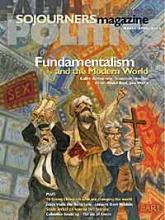"Praise the Lord!" read the headline in the Dec. 21, 2001 Washington Post. No, the Post hadn't gotten religion. The headline was summing up reviewer Desson Howe's response to Peter Jackson's adaptation of J.R.R. Tolkien's Lord of the Rings.
Howe wasn't alone in his enthusiasm. Jackson's opus received virtually unanimous praise. Many reviewers had Rings near or at the top of their "Best of the Year" lists, and the film is being mentioned as a serious Oscar contender.
Financially, the film is also an unqualified success. It grossed $74 million in its first five days, and it's possible that New Line Cinema, which spent nearly $300 million making the three films, will recoup its investment with the first film alone. It appears that Rings may join the book in achieving the status of cultural phenomenon. The question is: What can the church learn from hobbits?
The question is pertinent because, unlike nearly every other mass culture icon, Lord of the Rings is the product of an unmistakably Christian set of sensibilities. Its defining characteristics—the ideals that shaped the narrative, even the author's sense of what he was doing as he wrote—come straight out of Christianity.
Read the Full Article
